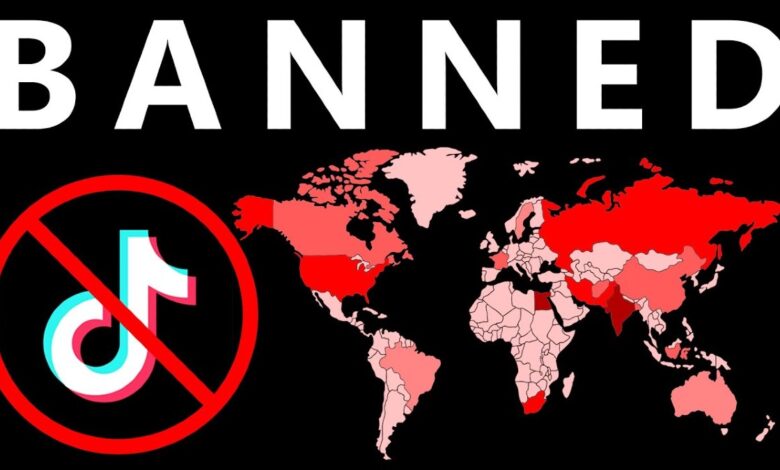TikTok ཐོག་འཕེལ་བཞིན་པའི་དྲ་རྒྱའི་སེམས་ཁུར། Growing security concerns over TikTok

འཕྲུལ་ལས་རིག་པ་ཡར་རྒྱས་ཇེ་ཆེར་ཕྱིན་པའི་ས་ཁམས་ཆབ་སྲིད་དང་། དམག་དོན། དཔལ་འབྱོར་བཅས་སྔར་ལས་ལྷག་བརྟེན་དགོས་པ་འགྱུར་ཡོད་ལ་དེང་རབས་ཀྱི་འཛམ་གླིང་ནང་ལག་རྩལ་ཡར་ཐོན་དེ་མཐོ་ཚད་གསར་པ་ཞིག་ཏུ་སླེབས་བཞིན་ཡོད་པ་ཧ་ཅང་གསལ་པོ་རེད། མ་ཟད་ dot.com གསར་བརྗེ་བྱུང་བ་ནས་བཟུང་ལོ་ངོ་ཉི་ཤུ་ལྷག་ཙམ་སོང་ཡོད་ལ། འཕྲུལ་རིག་ལག་རྩལ་ཁྱབ་ཁོངས་འདིའི་འཕེལ་རྒྱས་ཧ་ཅང་བྱུང་བཞིན་ད་ལྟའི་འཛམ་གླིང་དཔལ་འབྱོར་ཀྱང་མེད་དུ་མི་རུང་བའི་ཆ་ཤས་ཞིག་ཏུ་འགྱུར་ཡོད། སྤྱིར་དྲ་རྒྱ་ནི་ལོ་རྒྱུས་ཐོག་འཛམ་གླིང་ཡོངས་ལ་ཆ་འཕྲིན་ཕྱི་གསལ་ནང་གསལ་གྱི་མཉམ་སྤྱོད་དང་། སྲིད་དོན་ལས་རིགས་དང་། སྲིད་གཞུང་གི་མ་ལག་སྣ་ཚོགས། དངུལ་ཁང་བཅས་ཀྱི་ཆེད་བཙུགས་པ་ཞིག་ཡིན་ལ། དྲ་རྒྱ་ནི་ཆ་ཤས་ཅན་གཙོ་བོ་ཞིག་ཏུ་འགྱུར་ཡོད། མ་ཟད་དྲ་རྒྱའི་མཉེན་ཁ་ནས་ཐར་ཆེད་བདེ་འཇགས་ལྡན་པའི་མ་ལག་དགོས་རྒྱུ་ནི་ཧ་ཅང་གི་གལ་གནད་ཆེ། དེང་སང་ས་གནས་སོ་སོའི་དྲ་རྒྱའི་སྤྱོད་སྟངས་ལའང་ཁྲིམས་ལུགས་མི་འདྲ་བ་ཡོད། Splinternet ཞེས་པ་ནི་ལག་རྩལ་དང་། ཚོང་དོན། ཆབ་སྲིད། མི་རིགས་རིང་ལུགས། ཆོས་ལུགས། རྒྱལ་ཁབ་ཀྱི་ཁེ་ཕན་ཁ་ཐོར་དུ་སོང་བ་སོགས་རྒྱུ་རྐྱེན་སྣ་ཚོགས་ཀྱི་དབང་གིས་དྲ་སྦྲེལ་ཁ་གྱེས་པའི་ཁྱད་ཆོས་ལ་ཟེར། རྒྱ་ནག་གི་ལྕགས་རི་རིང་པོ་ཡང་ Splinternet གྱི་གྱོད་གཞི་ཞིག་ཡིན་པས། རྒྱ་ནག་མི་དམངས་སྤྱི་མཐུན་རྒྱལ་ཁབ་ཀྱིས་ཁྲིམས་འཛུགས་ཀྱི་བྱ་སྤྱོད་དང་ལག་རྩལ་ཟུང་འབྲེལ་བྱས་ནས་དྲ་སྦྲེལ་ལྟ་སྐུལ་དོ་དམ་ཡང་བྱེད་བཞིན་ཡོད་པ་རེད། འཛམ་གླིང་ཐོག་གི་དམར་ཤོག་རྒྱལ་ཁབ་ཆེ་ཤོས་ཤིག་ཡིན་པའི་ཆ་ནས། འཕྲུལ་རིགས་ལག་རྩལ་དང་རྨང་གཞིའི་སྒྲིག་བཀོད་གསར་ཤོས་ཀྱི་སྒོ་ནས་མི་དམངས་སྤྱི་དང་ལྷག་པར་དུ་མི་སེར་སྤེལ་བའི་ཆབ་སྲིད་ཀྱི་གྲངས་ཉུང་མི་རིགས་ལ་དབང་སྒྱུར་བྱེད་མཞིན་ཡོད་པ་རེད། ད་དུང་ ༢༠༢༣ ལོ་ནས་བཟུང་ཁ་པར་འཕྲུལ་རིགས་ལག་རྩལ་དང་། དངོས་པོའི་འཕྲིན་སྦྲེལ་དྲ་བ། སྤྲིན་གྱི་རྨང་གཞིའི་ལག་རྩལ། བཟོ་ལས་ཀྱི་གོ་རིམ་རང་འགུལ་ཅན། འཕྲུལ་མིའི་ལག་རྩལ། གཞི་གྲངས་ཆེན་པོ། མིས་བཟོས་རིག་སྟོབས་སོགས་ཁྱབ་ཁོངས་ཀྱི་གསར་བརྗེ་རྒྱུན་ཆད་མེད་པ་ཡོང་སྟབས་རྨང་གཞི་སྒྲིག་བཀོད་ལའང་མགོ་རྙོག་བཟོ་ཡི་ཡོད། རྒྱ་ནག་གི་འདས་ཟིན་པའི་ལོ་ངོ་ཉི་ཤུའི་ནང་ཞིབ་ཚགས་ཅན་གྱི་འཕྲུལ་རིག་རྨང་གཞིའི་སྒྲིག་བཀོད་འཕེལ་རྒྱས་མགྱོགས་མྱུར་བྱུང་བ་དེས་རྒྱལ་ཁབ་ཅིག་གི་ཞིབ་བཤེར་དང་ལྟ་སྐུལ་ཚོད་འཛིན་གྱི་ནུས་པ་ཁྱད་དུ་འཕགས་ཡོད། འོན་ཀྱང་རྒྱ་ནག་གི་གློག་འཕྲིན་དྲ་བ་དང་། གློག་རྡུལ་ཀུང་སི། ཁ་པར་ཉེར་སྤྱོད་གོ་རིམ་བཅས་ལ་འཛམ་གླིང་རྒྱལ་ཁབ་ཡོངས་ཀྱི་ཞིབ་འཇུག་བྱེད་བཞིན་ཡོད་ལ་ སྤྱོད་པ་པོའི་སྒེར་གྱི་གསང་དོན་རྒྱུན་སྲིང་བྱེད་སྟངས་དང་འཕྲུལ་རིགས་བདེ་འཇགས་ལྡན་མིན། རྒྱ་ནག་གཞུང་དང་འབྲེལ་བ་ཡོད་མིན་བཅས་ལ་དྲི་བ་ཡོངས་ཀྱི་ཡོད།
༢༠༡༧ ལོར་རྒྱ་ནག་དྲ་སྦྲེལ་ཀུང་སི་ ByteDance ཡིས་ Musical.ly སྤྱོད་ཉེར་སྤྱོད་གོ་རིམ་འདི་ཉོས་པ་རེད། ( Shanghai ནང་བརྟེན་གཞི་བྱེད་ཡོད་ཀྱང་སྤྱོད་མཁན་མང་ཆེ་བ་ཨ་རི་བ་ཡིན་པ་རེད། ) ཉོ་སྒྲུབ་བྱས་རྗེས། ByteDance (ད་ལྟ་འཛམ་གླིང་ཐོག་གི་ཆེས་ཆེ་བའི་གསར་གཏོད་ཀུང་སི་) ཡིས་ཉེར་སྤྱོད་གོ་རིམ་ TikTok དེ་བསྐྱར་དུ་འཕུར་སྟེགས་བྱེད་ཞིང་། ༢༠༡༨ ལོའི་ཟླ་ ༨ པའི་སྔོན་ལ་ Musical.ly གི་རྩིས་ཐོ་ཚང་མ་གནས་སྤོ་བྱས་པ་རེད། ༢༠༢༢ ལོའི་ལོ་མཇུག་ཏུ་ཟླ་རེར་ Tiktok སྤྱོད་མཁན་དུང་ཕྱུར་ ༡༠ ལྷག་ཙམ་ཡོད་པ་དང་། འཛམ་གླིང་ཡོངས་སུ་ཕབ་ལེན་ཐེངས་གྲངས་དུང་ཕྱུར་ ༣༠ བྱས་ཡོད། ཨ་རིའི་ནང་ TikTok སྤྱོད་མཁན་ཧ་ལམ་དུང་ཕྱུར་ 1.133 ཡོད་པ་དང་། ཡོ་རོབ་ཀྱི་ TikTok སྤྱོད་མཁན་དུང་ཕྱུར་ 1.5 ཙམ་ཡོད། འོན་ཀྱང་དོན་དངོས་ཐོག་རྒྱ་ནག་གི་འཕྲུལ་རིགས་ཀུང་སི་ཆེན་པོ་འདི་དག་གི་འཛམ་གླིང་ཡོངས་ལ་བཟོད་སྒོམ་བྱེད་ཐབས་བྲལ་བའི་སྒོ་ནས་སྤྱོད་མཁན་གྱི་གཞི་གྲངས་ཇི་ལྟར་ཐག་གཅོད་བྱེད་སྟངས་དང་། སྤྱོད་མཁན་འདི་དག་གི་གཞི་གྲངས་རྒྱུད་འཛམ་གླིང་རྒྱལ་ཁབ་མང་པོ་ལ་རྒྱལ་ཁབ་ཀྱི་བདེ་འཇགས་ལ་མཉེན་ཁ་བྱུང་སྲིད་པའི་ཉེས་འཛུས་ཡང་ཡོང་གི་ཡོད། རྒྱ་ནག་གི་འཕྲུལ་རིགས་ཀུང་སི་ཆེན་པོ་དང་དེའི་སྤྱོད་མཁན་གྱིས་ཞིས་ཅིན་ཕིང་གི་དུས་རབས་སུ་ལག་བསྟར་བྱས་པའི་གཞི་གྲངས་དང་དྲ་རྒྱའི་བདེ་འཇགས་བཅའ་ཁྲིམས་དང་ཁྲིམས་སྲོལ་རྣམས་ལ་བརྩི་སྲུང་ཞུ་དགོས། དཔེར་ན། རྒྱ་ནག་གི་གཞི་གྲངས་གསང་བའི་བཅའ་ཁྲིམས་ཀྱི་གཏན་འབེབས་ལྟར་ན། སྤྱོད་མཁན་གྱི་གཞི་གྲངས་འཚོལ་སྡུད་བྱེད་པ་རྣམས་་སྲིད་གཞུང་ལ་མཉམ་སྤྱོད་བྱེད་དགོས་པ་དང་། རྒྱ་ནག་གི་སྤྱི་ཚོགས་ཀྱི་མཉེན་ཆས་ཆེ་གྲས་ TikTok ཡིས་སྤྱོད་མཁན་གྱི་མིང་དང་། དགའ་ཕྱོགས། གནས་ཡུལ་གྱི་གཞི་གྲངས། སྒྲ་སྐྱེད་དང་པར་ཆས་ཀྱིས་ཟིན་བྲིས་བཅས་གཞི་གྲངས་འཚོལ་སྡུད་བྱེད་མུད་ཡིན། རྒྱལ་ཁབ་མང་པོ་ཞིག་གིས་ཁོ་ཚོའི་སྲིད་གཞུང་གི་དཔོན་རིགས་དང་ལས་བྱེད་རྣམས་ཀྱི་སྒྲིག་ཆས་ཁྲོད་དུ་ TikTok ལ་འབྲེལ་མཐུད་བྱེད་པའི་ཉེན་ཁ་ཡོད་པར་བསམ་གཞིགས་བྱེད་བཞིན་ཡོད། TikTok ཡི་ཁྱིམ་བདག་ཀུང་སིས་རྒྱ་ནག་གཞི་གྲངས་བདེ་འཇགས་བཅའ་ཁྲིམས་ལ་བརྩི་སྲུང་ཞུ་ཡི་ཡོད་སྟབས། རྒྱལ་ཁབ་མང་པོ་ཞིག་གིས་དྲ་རྒྱའི་བདེ་འཇགས་ལ་མུ་མཐུད་ནས་ཤུགས་རྐྱེན་ཐེབས་པར་བསམ་གཞིགས་བྱེད་བཞིན་ཡོད།
ཡོ་རོབ་མནའ་འབྲེལ་ཨུ་ཡོན་ལྷན་ཁང་ནི་ཡོ་རོབ་མནའ་འབྲེལ་གྱིས་ཁྲིམས་འཛུགས་དང་ལག་བསྟར་གྱི་འགན་འཁུར་བ་དང་ཡོ་རོབ་མནའ་འབྲེལ་གྱི་སྔོན་རྩིས་ལག་བསྟར་བྱེད་པའི་ཞིག་ལས་ཁུངས་ཡིན། དེའི་ནང་དུ་གཏན་འཇགས་ལས་བྱེད་དང་གན་རྒྱ་འཇོག་པའི་ལས་བྱེད་མཁྱོན་སྡོམ། ༣༢༠༠༠ ཡོད། ༢༠༢༣ ལོའི་ཟླ་ ༢ ཚེས་ ༢༣ ཉིན་ཡོ་རོབ་མནའ་འབྲེལ་ཨུ་ཡོན་ལྷན་ཁང་གིས་དྲ་རྒྱའི་བདེ་འཇགས་ཀྱི་གནད་དོན་དང་དེ་བས་ཞིབ་ཕྲའི་སྒོ་ནས་སྤྱོད་མཁན་གྱི་གཞི་གྲངས་ཐག་གཅོད་བྱེད་པ་རྒྱུད། TikTok བཀག་སྡོམ་བྱེད་ཡོད། བཀག་སྡོམ་འདིའི་རྒྱུད་ལས་བྱེད་རྣམས་ཀྱི་གཞུང་ཕྱོགས་ཀྱི་ཉེར་སྤྱོད་སྒྲིག་སྦྱོར་བྱས་པའི་མི་སྒེར་གྱི་སྒྲིག་ཆས་སྟེང་ TikTok བཀོལ་སྤྱོད་བྱེད་མི་ཐུབ། ཡོ་རོབ་མནའ་འབྲེལ་གྱི་མགྲིན་ཚབ་པ་ Sonya Gospodinova ཡིས་བཤད་རྒྱུར། “ཡོ་རོབ་མནའ་འབྲེལ་ཨུ་ཡོན་ལྷན་ཁང་གི་བདེ་འཇགས་ཀྱི་རྒྱུ་རྐྱེན་ཐོག་ནས་ཐག་གཅོད་བྱས་པ་རེད། “ཁོ་མོས་འགྲེལ་བརྗོད་གནང་སྐབས། “བྱེད་ཐབས་འདིའི་དམིགས་ཡུལ་ནི་ཨུ་ཡོན་ལྷན་ཁང་གི་ཁོར་ཡུག་ལ་དྲ་རྒྱའི་འཇབ་རྒོལ་ནས་སྲུང་སྐྱོབས། དྲ་རྒྱའི་བདེ་འཇགས་ཀྱི་འཇིགས་སྐུལ་དང་བྱ་སྤྱོད་ལ་སྲུང་སྐྱོབ་བྱེད་རྒྱུའི་ཆེད་དུ་ཡིན།” ཁོང་གིས་ད་དུང་བཀག་སྡོམ་འདི་ནི་”གནས་སྐབས་”དང་”རྒྱུན་ཆད་མེད་པར་ཞིབ་བཤེར་དང་ཡང་བསྐྱར་དཔྱད་ཞིབ་བྱ་རྒྱུ་ཡིན་”ཅེས་བཤད་འདུག། གྲོས་ཚོགས་ཀྱིས་ངོ་ནས་ ༢༠༢༣ ལོའི་ཟླ་ ༣ ཚེས་ ༢༠ ཉིན་ནས་བཟུང་ཁོ་ཚོའི་གཞུང་ཕྱོགས་ཀྱི་སྒྲིག་ཆས་ཐོག། TikTok བཀོལ་སྤྱོད་བྱེད་བཀག་སྡོམ་བྱེད་ཡོད་མོད། འོན་ཀྱང་ཁོང་ཚོས་ད་དུང་ལས་བྱེད་སྒེར་གྱི་སྒྲིག་ཆས་ནང་ནས་ཀྱང་། TikTok བཀོལ་སྤྱོད་མེད་པ་བཟོ་དགོས་པའི་སློབ་སྟོན་གནང་ཡོད། United States, Canada, United Kingdom, Taiwan, Denmark དང། Belgium བཅས་ཚུད་པའི་རྒྱལ་ཁབ་གཞན་དག་མང་པོར་སྲིད་གཞུང་གི་ལག་ཁྱེར་ཁ་པར་ཐོག་ནས་ TikTok བེད་སྤྱོད་བྱེད་པར་བཀག་སྡོམ་བྱས་ཡོད། ༢༠༢༠ ལོར་རྒྱ་གར་གྱི་རྒྱལ་ཁབ་བདེ་འཇགས་ལ་འཇིགས་སྣང་སྐུལ་བར་སེམས་ཁུར་བྱེད་པའི་རྐྱེན་གྱིས་རྒྱ་གར་ཡོངས་ལ་བཀག་སྡོམ་བྱས་པ་རེད། ༢༠༢༢ ལོའི་ཟླ་ ༤ པའི་ནང་། Afghanistan སོགས་ཨེ་ཤ་ཡའི་རྒྱལ་ཁབ་གཞན་དག་གིས་ TikTok བཀག་སྡོམ་བྱས་པ་དང་དུས་མཚུངས་སུ་ Pakistan གྱིས་ཀྱང་ ༢༠༢༠ ནང་ཐེངས་མང་པོར་གནས་སྐབས་བཀག་སྡོམ་བྱས་ཡོད།
དྲ་རྒྱའི་བདེ་འཇགས་ལ་སེམས་ཁུར་བྱེད་པ་ཕུད། TikTok ཡིས་རྒྱ་ནག་གི་མཚམས་སྦྱོར་བཅའ་ཁྲིམས་ལ་བརྩི་སྲུང་ཞུ་དགོས་ལ་སྟེགས་བུ་འདི་ནང་གི་ནང་དོན་རྣམས་ལ་མཐའ་གཉིས་ཀར་མ་ལྷུང་བྱ་རྒྱུ་ནི་ཀུང་སི་ཆེན་པོ་འདི་དག་གི་འགན་ཡིན། མདོར་བསྡུས་ན། TikTok ཡིས་ད་དུང་དྲ་སྦྲེལ་རང་དབང་ལ་རྒྱབ་སྐྱོར་བྱེད་མི་ཐུབ་ཞིང་རྒྱ་ནག་དང་འབྲེལ་བ་ཡོད་པའི་ས་ཁམས་ཆབ་སྲིད་དང་འགྲོ་བ་མིའི་ཐོབ་ཐང་གི་གནད་དོན་སྐོར་གྱི་དོན་དངོས་དང་། བསམ་བློ། འདུ་ཤེས་འཛིན་སྟངས། བསམ་འཆར་བཅས་བརྗེ་ལེན་ཆོག་པའི་སྟེགས་བུ་ཡང་བསྐྲུན་ཐུབ་མེད། TikTok ནི་རྒྱ་ནག་དམར་ཤོག་གི་སྲིད་དབང་ལ་ཚོར་བ་རྣོན་པོ་དང་ཁ་སྐྱེངས་དགོས་བའི་ནང་དོན་ལ་ཞིབ་བཤེར་བྱེད་བཞིན་ཡོད་པ་ཤེས་ཤིང་། སྐབས་འགར་བརྙན་ཕབ་དེ་བརྡ་ཁྱབ་ཁོ་ནར་མ་གཏོགས་མཐོང་མི་ཐུབ་པའམ་ཡང་ན་”འོས་སྦྱོར་བྱས་མེད། “བཅས་ཀྱི་སྤྱོད་རྒྱུ་ལའང་ཁག་པོ་བཟོ་ཡོད། འོན་ཀྱང་རྒྱ་ནག་གི་ཕྱི་རྒྱལ་ཁབ་མང་པོའི་ནང་བོད་དང་རྒྱ་ནག་གི་ནང་ TikTok ནང་དོན་བཀག་སྡོམ་བྱེད་པ་རྣམས་ནང་དོན་ཞིབ་བཤེར་བྱེད་ཞིང་སྤྱོད་མཁན་གྱིས་རྨང་གཞི་བྱས་པའི་ཁོངས་གཏོགས་ཁུལ་དུ་ཁྲིམས་མཐུན་ཆ་ནས་སྤྱོད་ཆོག་པ་རེད། རྒྱ་ནག་གི་ཞིབ་བཤེར་དེ་རྒྱལ་མཚམས་ལས་བརྒལ་ཏེ་རང་དབང་གི་སྤྱི་ཚོགས་སུ་སླེབས་པར་ཤུགས་རྐྱེན་ཚབས་ཆེན་ཐེབས་སྲིད་ཞིང་ ཞིབ་བཤེར་བྱ་ཡུལ་གྱི་ཆ་འཕྲིན་དེ་དག་ལ་རྩོད་གླེང་ཧ་ཅང་ཆེན་པོ་ཡོད་པའི་གནད་དོན་དཔེར་ན། The Tiananmen Square Massacre དང་། བོད་རང་བཙན། Falun Gong ཆོས་ལུགས་ཚོགས་པ། Hong Kong ནང་གི་རྒྱ་ཁྱབ་ཏུ་དྲིལ་བསྒྲགས་བྱེད་པའི་དམངས་གཙོའི་རྒོལ་གཏམ་བྱ་འགུལ། རྒྱ་ནག་གི་སྲིད་གཞུང་གི་ཡུ་གུར་ཁ་ཆེ་དང་ལྷོ་ཕྱོགས་སོག་ཡུལ་མི་རིགས་ལ་བཙན་ཤེད་ཀྱིས་སྐྱོན་བརྗོད་མང་པོ་བྱས་ཡོད། རྒྱ་ནག་ནང་ཁུལ་ Douyin (TikTok ཡི་ཁྱིམ་བདག་ཀུང་སི་གཅིག་གིས་བརྙན་འཕྲིན་གཙོ་གཉེར་བྱེད་པའི་ཞབས་ཞུ་ཞིག་ཡིན།) ནི་རྒྱ་ནག་ནང་སྤྱོད་ཆོག་ལ་ TikTok དང་བཀོལ་ཆས་མི་འདྲ་བ་ཡིན་པས། འདི་གཉིས་ཀྱི་ཉེར་སྤྱོད་གོ་རིམ་ཁྲོད་དུ་སྤྱོད་མཁན་ཕན་ཚུན་འགྲོ་འོང་བྱེད་ཐབས་བྲལ་བ་རེད།
འཛམ་གླིང་ཡོངས་ཀྱི་དྲ་སྦྲེལ་སྤྱོད་མཁན་མི་ཉུང་བ་ཞིག་གིས་སྤྱི་ཚོགས་དྲ་རྒྱ་དང་འཕྲིན་སྐྱེལ་ཉེར་སྤྱོད་གཞན་དག་ལ་བརྟེན་དྲགས་པའི་དུས་རབས་འདིར་འཕྲུལ་རིགས་བདེ་འཇགས་ཀྱི་རྙོག་དྲ་ལ་དོ་སྣང་དགོས། དཔེར་ན། TikTok སོགས་ཉེར་སྤྱོད་གོ་རིམ་ནི་དབྱིངས་ཞུགས་པའི་རྩིས་རྒྱག་ཐབས་སྤྱད་ནས་གསར་སྤེལ་བྱས་པ་དང་། ཐོ་ཁོངས་ཐོ་འགོད་བྱེད་སྐབས་ང་ཚོའི་མིང་དང་། ཁ་པར་ཨང་གྲངས། གློག་རྡུལ་ཡིག་ཟམ་སོགས་སྤྱོད་མཁན་གྱི་ཆ་འཕྲིན་མང་པོ་ཞིག་སྤྲད་དགོས་ཀྱི་ཡོད་པ་རེད། སྟེགས་བུ་འདི་དག་གིས་དྲ་ཐོག་ནས་ང་ཚོར་རིན་མེད་ཞབས་ཞུ་མཁོ་འདོན་བྱས་ཡོད་མོད། འོན་ཀྱང་ཁོ་ཚོས་ང་རང་ཚོའི་མི་སྒེར་གྱི་གཞི་གྲངས་དང་དྲ་ཐོག་གི་བྱེད་སྒོའི་རྐང་རྗེས་རྒྱུད་ཁེ་སང་བཟོད་བཞིན་པ་རེད། རྒྱ་ནག་གི་ཉེར་སྤྱོད་གོ་རིམ་དཔེར་ན་TikTok དང་། WeChat སོགས་རྒྱལ་སྤྱིའི་ཁྱབ་ཁོངས་སུ་བདེ་འཇགས་ཀྱི་མཉེན་ཁ་ཡོད་པ་མང་པོའི་སྐྱོན་བརྗོད་བྱེད་ཀྱི་ཡོད། དེའི་སྤྱོད་མཁན་གྱི་མི་སྒེར་གྱི་གཞི་གྲངས་དང་དྲ་ཐོག་གི་བྱེད་སྒོ་སྤེལ་ཚུལ་གྱི་ཐབས་བྱུས་ལག་ལེན་ལ་གཞིགས་ནས་ཉེར་སྤྱོད་གོ་རིམ་འདི་དག་ལ་ཞིབ་ཅིང་ཕྲ་བའི་ལྟ་སྐུལ་ཚོད་འཛིན་དང་ཞིབ་བཤེར་བྱེད་ཐབས་ཀྱི་སྲིད་བྱུས་ཡོད་པ་སྟོན་ཡོད། རྒྱ་ནག་གི་ཉེར་སྤྱོད་གོ་རིམ་འདི་དག་གི་ཁྱིམ་བདག་ཀུང་སིས་ངེས་པར་དུ་སྲིད་དབང་གི་བཅའ་ཁྲིམས་དང་སྲིད་ཇུས་ལ་བརྩི་སྲུང་ཞུ་དགོས་པའི་རྒྱ་ནག་གི་དབང་འཛིན་ལས་ཁུངས་ཀྱིས་ཀྱང་ཚོད་འཛིན་བྱས་ཆོག་ལ། རྩོད་གཞི་ཡོད་པའི་ཉེར་སྤྱོད་གོ་རིམ་འདི་དག་ལ་མཁོ་བའི་སྒྲིག་ཆས་ཀྱི་ཆོག་མཆན་ནང་སྒྲ་སྐྱེད་དང་། པར་ཆས། གནས་ཡུལ། གསོག་ཉར་སོགས་ཚུད་ཡོད། ཆ་འཕྲིན་འཁོར་རྒྱུག་བཞིན་པའི་ས་ཁུལ་འདི་དག་ནང་ལྟ་སྐུལ་ཚོད་འཛིན་དང་ཞིབ་བཤེར་བྱ་རྒྱུ་གཏན་འཁེལ་བྱས་ཡོད། དེར་བརྟེན་ང་ཚོ་མི་སྒེར་དང་། རྩ་འཛུགས། རྒྱལ་ཁབ་བཅས་ཀྱི་སོ་སོའི་ངོ་བོའི་ཆ་ནས་ང་ཚོའི་དྲ་ཐོག་གི་གསང་དོན་དང་བདེ་འཇགས་ཀྱི་ཆེད་དུ་ཉེར་སྤྱོད་དེ་རིགས་བེད་སྤྱོད་མི་བྱེད་པ་ནི་ཧ་ཅང་གལ་འགངས་ཆེ་བ་ཞིག་རེད། ང་ཚོས་ངེས་པར་དུ་སྤྱོད་མཁན་གྱི་གསང་དོན་དང་བདེ་འཇགས་ཀྱི་ཆེད་ཆུ་ཚད་འདང་ངེས་ཤེས་པའི་བདེ་འཇགས་སྟེགས་བུ་གཞན་རྣམས་ཚབ་བྱེད་ནས་སྤྱོད་དགོས། Youtube, Facebook, Instagram དང་། Triller སོགས་སྤྱི་ཚོགས་ཀྱི་དྲ་རྒྱའི་ཉེར་སྤྱོད་གོ་རིམ་དེ་ TikTok ལས་ཅུང་བདེ་འཇགས་ལྡན་ལ། Signal, Wire, Element དང་། WhatsApp བཅས་ཀྱང་། WeChat ལས་ཀྱང་བདེ་འཇགས་ལྡན་ཡོད།
གཤམ་ལ་ང་ཚོའི་སྒྲིག་ཆས་ཁྲོད་དུ་དྲ་ཐོག་གི་རྣམ་པ་སྲུང་སྐྱོབ་བྱེད་པའི་གནད་འགག་གི་གྲོས་འགོ་ཁག་འཁོད་ཡོད།
- ཉེར་སྤྱོད་བདེ་འཇགས།
- གལ་ཏེ་ཁྱེད་ལ་དགོས་མཁོ་མེད་ཚེ། སྒྲིག་སྦྱོར་མ་བྱེད། ཉེར་སྤྱོད་གོ་རིམ་ཡོད་ཚེ་སྒྲིག་སྦྱོར་བྱེད་པར་བཀག་འགོག་བྱས་ན། རྒྱུས་མེད་པ་དང་གཞུང་འབྲེལ་མ་ཡིན་པའི་ཉེར་སྤྱོད་གོ་རིམ་དང་འབྲེལ་བ་ཡོད་པའི་རྙོག་འཛིང་རང་བཞིན་དང་ཉམས་ཞན་རང་བཞིན་ཇེ་ཆུང་གཏོང་ཐུབ།
- ངེས་པར་དུ་སྒྲིག་སྦྱོར་མ་གནང་གོང་། ཉེར་སྤྱོད་གོ་རིམ་གྱི་ཆོག་མཆན་ལ་དོ་དམ་བྱེད་དགོས། ཉེར་སྤྱོད་ཆོག་མཆན་ལ་དོ་དམ་བྱ་རྒྱུ་ནི་གལ་འགངས་ཤིན་ཏུ་ཆེ་བ་ཞིག་ཡིན་པས། ང་ཚོའི་སྒྲིག་ཆས་དང་གཞི་གྲངས་ཀྱི་གནོད་ཚེ་རྣམས་ངན་སེམས་བཅངས་པའི་ཉེར་སྤྱོད་རྣམས་སྔོན་འགོག་བྱེད་ཐུབ།
- གསང་སྡོམ། དྲ་སྦྲེལ་གྱིས་ཉེར་སྤྱོད་གོ་རིམ་ནི་རྒྱུན་དུ་ཞབས་ཞུ་ཡོ་བྱད་དང་འབྲེལ་ནས་ཞབས་ཞུ་འདོན་སྤྲོད་བྱེད་པ་དང་། བདེ་འཇགས་ཀྱི་གསང་བའི་ལག་རྩལ་ལས་གྲུབ་པའི་ཉེར་སྤྱོད་གོ་རིམ་རྒྱུད་གཞི་གྲངས་ལ་གསང་སྡོམ་བརྒྱབ་ནས་སྤྱོད་མཁན་གྱི་བདེ་འཇགས་དང་གསང་དོན་སྲུང་སྐྱོབས་བྱེད་ཀྱི་ཡོད།
- ཉེར་སྤྱོད་གོ་རིམ་འདི་སུ་ལ་དབང་བ་ཡིན། ང་ཚོ་འཇིག་རྟེན་འདིའི་སྟེང་གི་སྡོད་གནས་ལ་གཞིགས་ནས་ངེས་པར་དུ་ཀུང་སིའམ་ཡང་ན་ཉེར་སྤྱོད་གོ་རིམ་གཉེར་སྐྱོང་བྱེད་མཁན་མི་སྒེར་གྱིས་ང་ཚོས་གཡོལ་འདོད་པའི་སྲིད་གཞུང་ཁ་ཤས་ལ་རང་མོས་དང་བཙན་ཤེད་ཀྱི་འོས་འགན་ཡོད་མེད་ལ་བལྟ་དགོས། ཁོ་ཚོར་སྤྱོད་མཁན་གྱི་གཞི་གྲངས་རྣམས་སྲིད་གཞུང་གང་རུང་ཞིག་དང་ལྷག་པར་དུ་སྤྱི་ཚོགས་རིང་ལུགས་སམ་ཆབ་སྲིད་རིང་ལུགས་ནང་ཞུགས་མཁན་རྣམས་ལ་རྩིས་སྤྲོད་བྱེད་པའི་ལོ་རྒྱུས་ཡོད་མེད་རྩད་གཅོད་བྱ་རྒྱུ་ནི་གལ་འགང་ཆེ།
- ཞབས་ཞུའི་ཡོ་བྱད་ཀྱི་གནས་ཡུལ། ང་ཚོས་ཉེར་སྤྱོད་གོ་རིམ་ཁྲོད་ཐོ་འགོད་བྱེད་སྐབས་འདོན་སྤྲོད་བྱས་པའི་མི་སྒེར་གྱི་གཞི་གྲངས་མང་ཆེ་བ་ཉེར་སྤྱོད་ཞབས་ཞུའི་ཡོ་བྱད་ནང་ཉར་ཚགས་བྱས་ཡོད། གལ་ཏེ་ཉེར་སྤྱོད་གོ་རིམ་འདིའི་གཞི་གྲངས་ཞབས་ཞུའི་ཡོ་བྱད་དེ་སྲིད་དབང་སྒེར་གཅོད་ས་ཁུལ་དུ་གནས་ཡོད་ན། རྒྱལ་ཁབ་ཀྱི་བདེ་འཇགས་ལ་འཇིགས་སྣང་བཟོ་བ་རེད།།
- བེད་མེད་སྡེབ་གསོག་མ་བྱེད། ང་ཚོའི་སྒྲིག་ཆས་ནང་གི་ཚོར་བ་སྐྱེན་པའི་ཆ་འཕྲིན་གཙང་བཤེར་གང་ཐུབ་བྱས་ཏེ་ཞིབ་དཔྱོད་དཔོན་གྱི་ཁུངས་འདེད་རང་བཞིན་དང་འགན་འཁྲི་ལམ་ལུགས་ལ་ནམ་ཡང་དང་ལེན་མི་ཞུ།། སྒྲིག་ཆས་ནང་གི་ཚོར་བ་སྐྱེན་པའི་གཞི་གྲངས་གསོག་འཇོག་བྱས་ནས་དུས་ཡུན་ཅུང་རིང་པོ་ཞིག་འགོར་རྗེས་དེའི་སྤྱོད་མཁན་འཛིན་བཟུང་དང་ཉེས་དོན་ཉེས་ཆད་གཅོད་རྒྱུར་ཉེན་ཁ་བཟོ་སྲིད།
- VPNs སོགས་གཡོལ་ཐབས་ཡོ་བྱད་བེད་སྤྱོད་བྱས་ན། ང་ཚོས་དུས་རྒྱུན་འབྲེལ་གཏུག་ཁྲོད་དུ་ཡིད་རྟོན་རུང་བའི་ VPN བཀོལ་སྤྱོད་བྱས་ན་རང་ཉིད་ཀྱི་ངོ་བོ་སྦས་སྐུང་བྱེད་ཀྱི་ཡོད། VPN ཀྱི་རྒྱུད་འབྲེལ་གཏུགས་ལ་ལྟ་ཞིབ་ཚད་ལེན་བྱེད་པའི་དབང་འཛིན་ལས་ཁུངས་འདི་དག་ལས་ཁུངས་འདེད་རང་བཞིན་ནས་སྐྱོབས།
- ཁྱོད་ཀྱི་སྒྲིག་ཆས་གསར་མནོོན་བྱོས། ང་ཚོའི་སྒྲིག་ཆས་ཀྱི་མཉེན་ཆས་དང་བཀོལ་སྤྱོད་མ་ལག་གསར་མནོན་ཡང་ན་ནུས་ཤུགས་ཡོད་རྒུ་བཏོན་ནས་སྒྲིག་སྦྱོར་བྱས་ནས་ཉུལ་ཆས་དང་སྐྱོན་གཏོང་མཉེན་ཆས་རྙིང་པ་ནས་སྲུང་སྐྱོབ་བྱེད་ཐུབ་པར་ང་ཚོས་ཡིད་ཆེས་བྱེད་ཀྱི་ཡོད།
- བདེ་འཇགས་ཀྱི་འཕྲིན་སྐྱེལ་སྟེགས་བུ་འདེམས། སྲིད་དབང་སྒེར་གཅོད་ལམ་ལུགས་ཀྱིས་བརྗེ་རེས་བྱེད་བཞིན་པའི་ཆ་འཕྲིན་ལ་ཚོར་བ་རྣོན་པོའམ་ཡང་ན་”ངོས་འཛིན་”བྱེད་སྐབས་བདེ་འཇགས་ཀྱི་འཕྲིན་སྐྱེལ་ཉེར་སྤྱོད་གོ་རིམ་སྤྱོད་རྒྱུ་ནི་ཧ་ཅང་གལ་འགངས་ཆེ།
In this modern world which heavily relies on technology for geo-political, military and economic reasons, it is quite evident that nations are taking their technological advancements to new heights. After more than two decades since the dot.com revolution, the developments in this field of technology saw exponential growth and it eventually became an indispensable part of the world economy that we see today. Although the internet was historically built on the pillars of transparency and accessibility of information worldwide, various political and government systems with its industries and banking sectors eventually became highly dependent on the internet and consequently, safe and secure internet infrastructures became an essential requirement to protect it from being exploited in the wild. In times where the internet is so localized, different countries are imposing their own regulations on how the internet access would look like in their nation. Splinternet refers to the characterization of the Internet as splintering and dividing due to various factors, such as technology, commerce, politics, nationalism, religion, and divergent national interests. The Great Firewall of China is also a case of splinternet, where the People’s Republic of China imposes a combination of legislative actions and technologies to regulate the Internet domestically. Being the largest communist nation in the world, it viciously exercises dominance and control over its citizens and colonized political minorities by incorporating the latest trends in technology and infrastructure developments. As of 2023, revolutions in the field of Mobile Technology, Internet of Things (IoT), Cloud-Based Technology, Industrial process automation, Robotics, Big Data and Artificial Intelligence are constantly evolving, giving rise to sophisticated digital infrastructures. China’s swift progress in developing sophisticated digital infrastructures within the past two decades have excelled its censorship and surveillance capabilities as a nation. Nevertheless a large number of Chinese telecom networks, electronic companies and mobile applications have faced numerous scrutiny from nations around the globe over how their technology companies operate, how they maintain privacy and security of its users and whether these companies have any close connection with the Chinese government.
The European Commission is the executive arm of the European Union which is responsible for proposing and enforcing legislation and in the implementation of the EU budget. It consists of 32000 permanent and contract employees. On 23rd Feb of 2023, The European Commission banned TikTok from staff devices over concerns about cyber security practices of the platform and more specifically over how it handles user data. The ban also includes that European Commision staff cannot use TikTok on their personal devices that have official apps installed. The EU spokeswoman Sonya Gospodinova said the corporate management board of the European Commission, the EU’s executive arm, had made this decision for security reasons. In her statement, she mentioned that “The measure aims to protect the Commission against cybersecurity threats and actions which may be exploited for cyberattacks against the corporate environment of the commission,”. Furthermore she added that the ban was “temporary” and “under constant review and possible reassessment.” Although the parliament suspended the use of TikTok on their official devices from 20th March 2023, they also strongly recommended its members and staff to remove TikTok from their personal devices as well. The ban of TikTok on government phones has been introduced to many other countries as well which include the United States, Canada, United Kingdom, Taiwan, Denmark and Belgium. In 2020, TikTok was also banned nationwide in India as concerns grew over its potential threat to the national security of India. While other Asian countries such as Afghanistan banned the platform in April 2022 stating that it leads their youths “astray” and similarly, Pakistan also temporarily banned TikTok several times in 2020 saying its content is “immoral” and “obscene”.
Apart from cybersecurity concerns over TikTok, TikTok is required to abide by China’s intermediary laws in which the tech giants would be responsible for a content moderation policy on their platforms which shall strictly be in accordance with the Chinese government. In a nutshell, TikTok also failed to provide a platform that supports internet freedom to exchange facts, ideas, ideologies and opinions concerning geo-political and human rights issues associated with China. TikTok was found to be censoring content which could be sensitive and embarrassing to the Chinese regime, at times quietly changing videos to be visible only to the poster or labeling them as “not recommended” or “not for feed,” thereby making them difficult to access. However, even outside of China, TikTok has been found censoring content that may be banned in Tibet and China but is legal in the jurisdictions where its users are based. This raises some serious implications of Chinese censorship reaching far beyond its borders into free societies. Such censored information has included highly controversial issues such as the Tiananmen Square massacre, Tibetan independence, the religious group Falun Gong, widely publicized pro-democracy protests in Hong Kong, Chinese government oppression of the Uyghur Muslim and South Mongolian population, and other issues that criticize the social structure of the CCP. Inside China, Douyin (a short form video hosting service by the same parent company of TikTok) is accessible as TikTok doesn’t operate inside China. Douyin and Tiktok are two completely separate entities and consequently users on these two short video apps cannot interact with each other.
In an era where a lot of internet users around the world are consumed by an excessive dependence on social media and other messaging apps, it is crucial that we should be aware of their security implications in the long run. For instance, mobile apps such as Tiktok are developed with addictive algorithms to attract more users which usually requires user information in registering an account such as our names, phone numbers and emails. Although these platforms seemingly provide free services for us on the internet, in return they also make profit through our personal data and our vast footprints of online activity on their platforms. Chinese applications such as TikTok and WeChat have relentlessly faced criticism in the international scene as a high security threat. Based on its manipulation of personal data of its users and their online activity, these apps were found to incorporate sophisticated surveillance and censorship tactics. The device permissions required in installing these apps can also be manipulated by Chinese authorities upon request as parent companies of these Chinese apps must abide by the strict laws and policies of the regime. Such device permissions required by these controversial applications include microphone, camera, location and storage. In a region where the flow of information is being controlled, surveillance and censorship are certain. Thus refraining from using such applications is very essential for the sake of our online privacy and security as individuals, organizations and nations at large. We must switch to alternative secure apps that not only provide us an entertainment platform but maintains an adequate level of user privacy and security. Social media apps such as Youtube, Facebook, Instagram and Triller are comparatively safer than TikTok. Likewise Signal, Wire, Element and WhatsApp are way more secure than WeChat.
Some of our key recommendations to secure online presence in our devices are as mentioned below.
- App Security :
- Don’t install if you don’t need them : Refraining from installing seemingly cool apps which you don’t really need minimizes complexity and vulnerability associated with unknown and unofficial applications.
- Always check the app permission before installing : Reviewing app permissions is essential to prevent malicious apps from compromising our device and data by exploiting the permissions we provide them.
- Encryption : Applications that run by the internet always communicate with its servers to deliver its services. Apps which consist of secure encryption technologies encrypt the data which is transmitted from the user to the server and thus maintains security and privacy of the user.
- Who owns the app : Depending on where we live in this world, we must ensure whether the company or that individual running the app has any voluntary or forced obligation towards certain governments we may want to avoid. It is vital to ascertain whether they have any history of handing over user data to any government who have requested it, especially those who are involved in social or political activism.
- Server Location : Much of our personal data we provide in registering an account in an application are stored within the app server. If the data servers of such apps are located in an authoritarian region where tech companies have an obligation to play by the rules of its regime, the data within these servers are at risk of being exploited for economic and geo-political reasons. This also may pose a potential threat on the national security level.
- Don’t be hoarder : Sensitive information in our devices should be cleared as frequently as possible to defy traceability and accountability from the prosecutor. Hoarding sensitive data in devices for a longer duration may put its user in jeopardy of being arrested and criminalized.
- Using circumvention tools such as VPNs : We also believe that in daily communication we can hide our personal identities on a certain level by making use of reliable and trustworthy VPNs. Using VPNs reduces the traceability from the authorities who monitor the communications.
- Updating your device : We also believe that updating our device software/OS to the latest version can protect us from outdated spywares and malwares if installed forcefully or accidentally as well.
- Choose secure communication platforms : It is very important to use secure messaging applications when the information being exchanged between two parties is sensitive or “deemed” sensitive by an authoritarian regime.
